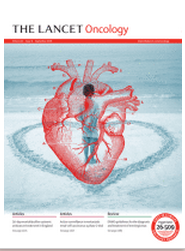
图片来源:medicalxpress.com
在癌症患者中,早期诊断主要包括原发性肿瘤的诊断以及对癌症是否转移进行诊断等,比如原发性肿瘤位点的癌细胞会逃离原来的位置在患者机体其它部位中增殖发展;然而在大约5%至10%的人类肿瘤中,这项过程都已经进行了,即研究者们发现了癌症转移的迹象,尽管研究者们采用了多种诊断策略,但并未检测到原发性肿瘤的存在,这种情况就称之为调查未明原发癌(Cancer of unknown primary,CUP),由于研究者们对肿瘤的类型并不知道,因此患者的生存往往非常有限。
如今刊登在国际杂志The Lancet Oncology上的一项研究报告中,来自Bellvitge医学院等机构的研究人员通过研究表示,我们或许可以利用一种新开发的表观遗传学检测技术—EPICUP来寻找引发患者机体癌症转移的原发性肿瘤的类型,而这也将帮助临床医生们开发出更多特异性的疗法来治疗相对应的癌症。
研究者Manel Esteller说道,很多年前我们都知道调节基因活性的化学模式对于每个组织而言都具有一定的特异性,比如相比肺部细胞而言胰腺细胞往往具有一定的差异;为此这项研究中研究者对超过1万份的人类肿瘤样本中每一种类型癌症进行研究,分析了其表观遗传学特性,如今当研究者调查携带未知转移性肿瘤患者的细胞DNA时,表观遗传组的成像信息或许就可以告诉研究者这些肿瘤细胞属于胰腺癌、肺癌、结肠癌或者乳腺癌家族,换句话说,其就可以帮助研究者寻找到肿瘤的起源。
通过表观遗传学测试对癌症类型进行鉴别对于后期患者的疗法选择非常重要,研究者表示,从现在开始,癌症患者将不会被盲目治疗了,我们可以针对不同癌症类型对患者提出更具针对性的治疗方法,而且患者的生存率也将被大幅提高。后期研究者们或将继续探索新型方法来对未知来源的肿瘤进行鉴别。

doi:10.1016/S1470-2045(16)30297-2
PMC:
PMID:
Epigenetic profiling to classify cancer of unknown primary: a multicentre, retrospective analysis
Sebastian Moran, MSc, Anna Martínez-Cardús, PhD, Sergi Sayols, MSc, Eva Musulén, MD, Carme Balañá, MD, Anna Estival-Gonzalez, MD, Cátia Moutinho, PhD, Holger Heyn, PhD, Angel Diaz-Lagares, PhD, Manuel Castro de Moura, MSc, Giulia M Stella, MD, Prof Paolo M Comoglio, MD, Maria Ruiz-Miró, PhD, Xavier Matias-Guiu, MD, Roberto Pazo-Cid, MD, Antonio Antón, MD, Rafael Lopez-Lopez, MD, Gemma Soler, MD, Federico Longo, MD, Isabel Guerra, MD, Sara Fernandez, MD, Yassen Assenov, PhD, Prof Christoph Plass, PhD, Rafael Morales, MD, Joan Carles, MD, Prof David Bowtell, PhD, Linda Mileshkin, MD, Daniela Sia, PhD, Richard Tothill, PhD, Josep Tabernero, MD, Prof Josep M Llovet, MD, Prof Manel Esteller
Background Cancer of unknown primary ranks in the top ten cancer presentations and has an extremely poor prognosis. Identification of the primary tumour and development of a tailored site-specific therapy could improve the survival of these patients. We examined the feasability of using DNA methylation profiles to determine the occult original cancer in cases of cancer of unknown primary. Methods We established a classifier of cancer type based on the microarray DNA methylation signatures (EPICUP) in a training set of 2790 tumour samples of known origin representing 38 tumour types and including 85 metastases. To validate the classifier, we used an independent set of 7691 known tumour samples from the same tumour types that included 534 metastases. We applied the developed diagnostic test to predict the tumour type of 216 well-characterised cases of cancer of unknown primary. We validated the accuracy of the predictions from the EPICUP assay using autopsy examination, follow-up for subsequent clinical detection of the primary sites months after the initial presentation, light microscopy, and comprehensive immunohistochemistry profiling. Findings The tumour type classifier based on the DNA methylation profiles showed a 99•6% specificity (95% CI 99•5–99•7), 97•7% sensitivity (96•1–99•2), 88•6% positive predictive value (85•8–91•3), and 99•9% negative predictive value (99•9–100•0) in the validation set of 7691 tumours. DNA methylation profiling predicted a primary cancer of origin in 188 (87%) of 216 patients with cancer with unknown primary. Patients with EPICUP diagnoses who received a tumour type-specific therapy showed improved overall survival compared with that in patients who received empiric therapy (hazard ratio [HR] 3•24, p=0•0051 [95% CI 1•42–7•38]; log-rank p=0•0029). Interpretation We show that the development of a DNA methylation based assay can significantly improve diagnoses of cancer of unknown primary and guide more precise therapies associated with better outcomes. Epigenetic profiling could be a useful approach to unmask the original primary tumour site of cancer of unknown primary cases and a step towards the improvement of the clinical management of these patients. Funding European Research Council (ERC), Cellex Foundation, the Institute of Health Carlos III (ISCIII), Cancer Australia, Victorian Cancer Agency, Samuel Waxman Cancer Research Foundation, the Health and Science Departments of the Generalitat de Catalunya, and Ferrer.

